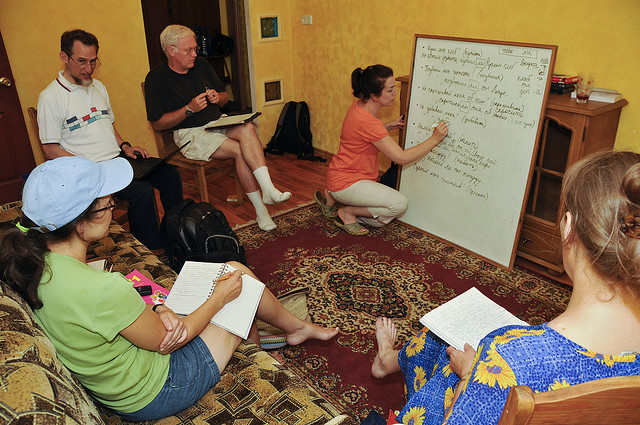How Bryn Mawr’s Sharon Bain learned about culture shock
By Tianyuan Zhang
Sharon Bain never expected she would be shocked by her own native culture.
On December 23rd, 1991, Bain returned to America from Russia, where the Communist regime was about to collapse. She went grocery shopping for the first time in four months. As she wandered down the aisle of laundry detergents, surrounded by different brands of detergents for different machines with different scents, Bain was surprised and completely lost. She stood there, indecisively, until her mother came, grabbed a box of detergent and took her home.
“In Russia, you were happy if you could find a bag of sugar,” said Bain, “But in America, not only were the stores filled with things you really needed, but also with things that nobody needed.”
Bain started wondering why culture shock happened and how the differences between two cultures reconciled. Seventeen years later, as a lecturer in Russian department at Bryn Mawr College, she has designed a writing seminar called “Culture Shock,” which focuses on the understanding of stories about people entering new cultures.
“Culture shock is a constant process of assessment and diagnosis,” she said. “I like sharing my experiences of navigating new cultures and the way which helps me become the person I am.”
Bain’s exposure to culture shock started as early as when she was six months old, when her family moved from Virginia to south California.
“I grew up in that casual culture,” she said, “I called my friends’ parents by their first names.”
At age 12, she moved to South Carolina, the conservative “Bible Belt.” There she had her first taste of culture shock. While enjoying the southern hospitality, Bain learned the importance of respect, addressing people as
“Mister” or “Missus” and saying “yes, Sir” instead of simply “yes.”
Four years later, Bain moved to Pennsylvania, where she described as a “more reserved” place. Different from the cordial South, said Bain, friendships in the Northeast took more time to form.
Bain said her early experience of seeing things she liked and disliked around the country indirectly influenced her future interest in Russian and other cultures.
It was during the Cold War when Bain decided to learn Russian.
She just came to the Philadelphia area.
“I was the new kid. I was already odd, so why not?” Bain joked about her decision, “but Russian also interests me.”
Her interest came from her doubt in what she saw in the media. Russians were always the evil guys on the screens, Bain said. She figured there must be more than that.
“It’s not possible that all Russians are bad,” said Bain, “I wanted to find out the truth.”
She finished a B.A. in Russian studies at University of Delaware, got her M.A. at Bryn Mawr College in 1998, taught Russian at University of Delaware from 2002 to 2004, and has worked at Bryn Mawr College since 2004, after she finished her Ph.D.
Not very long before the dissolution of Soviet Union, in September, 1991, a group of students with the American Council study group arrived in Russia. Among them was Bain, who expected to see extreme chaos in this crumbling society.
“What I saw was, really, people trying to live their lives in an extreme environment.” said Bain. Her wealthy American life did not make her feel superior, instead, “I felt like an infant, because I had to learn how to live that difficult live.”
She learned to think carefully about when and where to spend her Russian tickets, the only “currency” for necessities at that time. Lack of communication with her family depressed Bain, making her homesick, especially at Thanksgiving time. Language barriers also brought difficulties to Bain’s life. She faced the pressure of becoming the “spokesman” for America.
“People would take my words as what Americans thought,” Bain said. She appreciated Russian’s enthusiasm about America, but meanwhile, “I needed to be really careful.”
Nevertheless, Bain was amazed at the immediate intimacy from Russians. She was never unwelcomed in Russia despite the influence of Cold War.
Bain said she took away many valuable lessons from culture shock.
“Certainly culture shock throws you off balance,” she said, “but you learn how to find your equilibrium.”
Bain said it was more important to understand the source of culture shock than to resolve it immediately. She also expected her students from “Culture Shock” seminar to do the same in discussions.
“I want them to present different opinions,” said Bain, “it gives them a chance not only to listen, but to understand a perspective and question their own ones.”
Bain values an open mind, as it helps her to find balance despite any conflicts. However, she said, “open” doesn’t mean “indecisive.”
“You have to ask yourself what you really think about one thing and land your mind on that,” Bain explains, “You need to land on something solid.”

